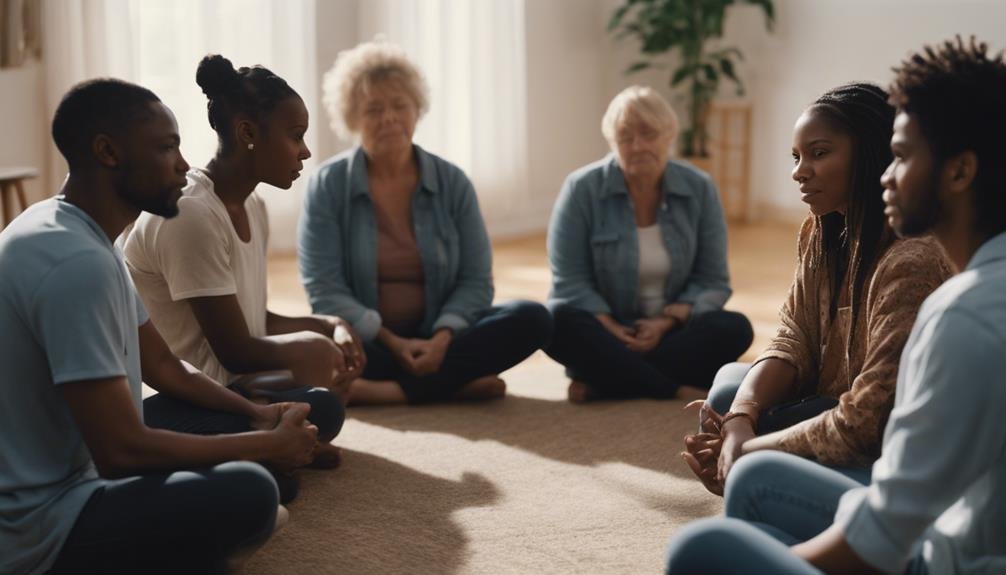Supporting sexual abuse survivors involves listening without judgment, believing and validating their experiences, respecting their healing journey, assisting in finding support systems, and showing essential support. By creating a safe and supportive environment through non-judgmental listening, we validate their emotions and empower them to take control. Believing and validating their experiences signals that their feelings are valid and aids in their mental well-being. Respecting their unique healing journey, acknowledging their pace, and assisting in finding reliable support systems are vital steps. Demonstrating unwavering support, validation, and encouragement can make a profound difference in their recovery journey.
Key Takeaways
- Listen without judgment, create safe space.
- Believe and validate experiences, aid healing.
- Respect unique journey, honor decisions.
- Assist in finding support systems, resources.
- Show unwavering support, encourage accessing help.
Listen Without Judgment
To truly support sexual abuse survivors, it’s essential to listen to their experiences without judgment. When a survivor of sexual abuse opens up about their trauma, providing a non-judgmental ear is key to creating a safe and supportive environment. By listening without passing blame or doubt, we allow survivors to feel heard and believed, validating their emotions and experiences.
This act of attentive listening plays an important role in the survivor’s healing process, as it shows them that their feelings are valid and important. Research indicates that survivors who are listened to without judgment are more likely to seek help and start on a path towards recovery. By offering a compassionate and understanding presence, we empower survivors to take control of their healing journey and make decisions that align with their needs.
This non-judgmental approach not only aids in the healing process but also fosters a sense of trust and safety for the survivor.
Believe and Validate Their Experience

Listening without judgment sets the foundation for supporting sexual abuse survivors; believing and validating their experience is a critical next step in their healing journey. Survivors of sexual assault often face disbelief and skepticism, which can compound the trauma they’ve endured. By choosing to believe and validate their experiences, we signal to survivors that their feelings and memories are valid and important.
Research underscores the pivotal role that validation plays in a survivor’s recovery process. When survivors feel believed, they’re more likely to seek help and engage in healing activities. Validating their experiences not only fosters a sense of safety and trust but also contributes significantly to their mental health and overall well-being.
In supporting survivors of sexual assault, our willingness to believe and validate their experiences can make a profound difference in their healing journey. Let’s stand with survivors, offering unwavering support and validation as they navigate the path towards healing and empowerment.
Respect Their Healing Journey
Acknowledging the survivor’s unique healing journey and respecting their pace of recovery is paramount in providing effective support. Each individual’s path to healing from sexual abuse is distinct, influenced by personal experiences and coping mechanisms.
It’s crucial to understand that recovery isn’t a linear process; survivors may face setbacks and progress at their own speed. By honoring the survivor’s decisions and choices regarding their healing journey, we empower them to reclaim autonomy and control over their lives.
Throughout this journey, offering unconditional support and validation can be immensely comforting. Recognizing the survivor’s strength and resilience in dealing with the challenges they encounter demonstrates our unwavering commitment to standing by them.
Assist in Finding Support Systems

We can play an important role in supporting sexual abuse survivors by actively assisting them in finding reliable and compassionate support systems.
It’s essential to help survivors connect with support groups, counselors, or therapists who specialize in providing emotional assistance tailored to their needs. Encouraging survivors to reach out to crisis hotlines or local organizations dedicated to supporting survivors of sexual abuse can offer immediate help and guidance during difficult times.
Additionally, assisting in identifying trusted friends, family members, or community resources that can provide ongoing support is critical for their healing journey.
Furthermore, providing information on survivor advocacy programs and legal services can empower survivors to navigate the recovery process with the necessary resources and guidance. Supporting survivors in creating a safety plan to address potential triggers or unsafe situations is another way to safeguard their well-being and security moving forward.
Show Unwavering Support
To best support sexual abuse survivors, demonstrating unwavering support is vital in validating their experiences and fostering a safe environment for healing and recovery. When a survivor discloses their story of sexual assault, it’s essential to believe them wholeheartedly. Expressing belief in their account can help them feel heard and supported during a time of vulnerability. Additionally, offering to accompany the survivor for medical care or when reporting the assault to authorities can provide a sense of security and empowerment.
Emotional support plays a significant role in the healing process for survivors. Providing reassurance without judgment and creating a safe space for them to express their feelings can be immensely beneficial. Encouraging the survivor to access resources like the National Sexual Assault Hotline for further assistance can also be a valuable form of support.
Educating ourselves on how to be supportive allies to survivors of sexual abuse is essential in creating a compassionate and understanding environment for their healing journey.
Frequently Asked Questions
What Is the Best Way to Provide Support to Survivors?
When supporting survivors, emotional validation and active listening are crucial.
Encourage seeking professional therapy and utilizing community resources like helplines.
Self-care techniques can also aid in their healing journey.
Remember, patience is essential, and checking in periodically shows ongoing care.
Conclusion
In supporting sexual abuse survivors, let’s remember to:
- Listen with love
- Believe their truths
- Respect their paths to healing
- Assist in finding support
- Show unwavering support
Together, we can create a compassionate community for survivors to feel safe and supported as they navigate their journey towards healing and recovery.
Let’s stand in solidarity with survivors, offering empathy, understanding, and encouragement as they bravely reclaim their sense of self and strength.






